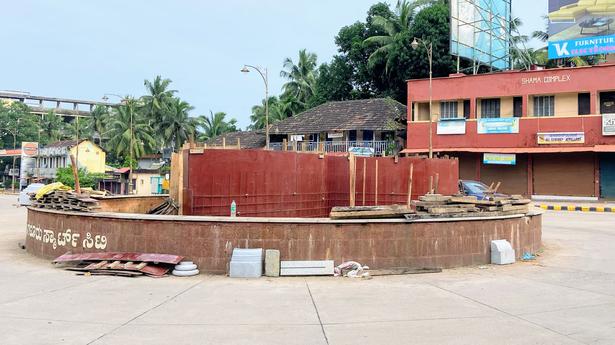
Mangaluru civic body accused of executing ‘unscientific and people-unfriendly’ works
The Hindu
Social activist Gopalakrishna Bhat says waste of public money by the civic body is deplorable
Mangaluru City Corporation (MCC) is already accused of executing unscientific and people-unfriendly projects, but appears to be committing another blunder in the development of Mangaladevi Circle at Jeppu. The work is being executed in a manner so as to completely obstruct the view of drivers in the rotary circle.
Mangaluru Smart City Ltd. (MSCL), while concreting the road from Mangaladevi temple to first railway bridge, had laid a high-mast light, which functioned as the circle before the development. The beautification work, however, is being undertaken by MCC, said sources in MSCL.
Retired superintending engineer with Public Works Department B.S. Balakrishna said, as per the Indian Road Congress norms, any rotary circle should be 1.2 metre below the eye-sight of a driver approaching the circle. The Mangaladevi Circle appears to be more than 4 metres above ground level and about 3 metres from a driver’s point of view. This is highly unscientific and putts motorists as well as pedestrians in grave danger, Mr. Balakrishna said.
Mangaladevi Circle witnesses considerable vehicular movement since it connects the city with southern parts of Mangaluru, including National Highway 66 towards Kerala.
Mayor Premananda Shetty defended the work saying architects associated with the beautification have told that the work would not obstruct drivers’ view.
Trial and error at State Bank
In another instance of wrong engineering, Mangaluru City Corporation erected a couple of passenger shelters at a height of at least 15 feet above the ground while developing the State Bank Terminal with a concrete tarmac at an estimated cost of ₹4.2 crore.

Prodancy Pvt Ltd, a medtech startup specialising in surgical consumables for joint replacement surgeries, has successfully raised ₹2.14 crore in a funding round co-led by Campus Angels Network and Keiretsu Forum Chennai, which also saw participation from existing investors Center for Cellular & Molecular Platforms (C-CAMP) and other angel investors.

“Writing, in general, is a very solitary process,” says Yauvanika Chopra, Associate Director at The New India Foundation (NIF), which, earlier this year, announced the 12th edition of its NIF Book Fellowships for research and scholarship about Indian history after Independence. While authors, in general, are built for it, it can still get very lonely, says Chopra, pointing out that the fellowship’s community support is as valuable as the monetary benefits it offers. “There is a solid community of NIF fellows, trustees, language experts, jury members, all of whom are incredibly competent,” she says. “They really help make authors feel supported from manuscript to publication, so you never feel like you’re struggling through isolation.”









